- This is Part I in a Three Part Series -
This article originally published on our Home Page in May 2012
With this article we begin the first of a series of
three essays on technology and war. We start by analyzing the impact of
nuclear weapons and the concept of the ultimate weapon on war, continue in
the next article with a discussion on how technology shapes warfare, and in
the last article end with a final essay on what makes modern military
technology different from that of the pre-modern period, from the
commander's perspective. Join us each month, and feel free to send us your
comments.

 As we all know, many of the
scientists who worked on the development of the atom bomb
had misgivings as to whether it was the morally and
ethically responsible
thing to do; to develop a bomb with such great capabilities,
killing power, and ability to destroy humanity. A number of
them, including Albert
Einstein himself, wrote to
President Franklin Roosevelt to express their concerns, yet
at the same time urged that the bomb be built. Looking back
at the advent and use of emerging technologies for military
purposes, this instance of the scientists involved in the
advancement of technology stepping forward and warning of
the consequences of what they were doing was probably the
first example of society recognizing that there is both a
positive and a negative side to the inexorable advance of
science.
As we all know, many of the
scientists who worked on the development of the atom bomb
had misgivings as to whether it was the morally and
ethically responsible
thing to do; to develop a bomb with such great capabilities,
killing power, and ability to destroy humanity. A number of
them, including Albert
Einstein himself, wrote to
President Franklin Roosevelt to express their concerns, yet
at the same time urged that the bomb be built. Looking back
at the advent and use of emerging technologies for military
purposes, this instance of the scientists involved in the
advancement of technology stepping forward and warning of
the consequences of what they were doing was probably the
first example of society recognizing that there is both a
positive and a negative side to the inexorable advance of
science.
Yet is that really the case?
Perhaps more importantly, is it really the case that
military use of emerging technologies always
represents the dark side of life, while civilian use
of it represents the bright side?
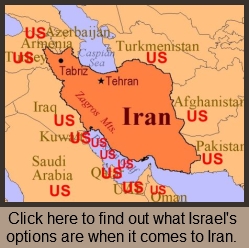 Ask
the average man on the street and he would surely
say that the military is quick to find terrible uses
for new technology. Like some Darth Vader, the
military is usually portrayed as skulking down the
back alleys of civilization, looking for a chance to
wreck its worst on society by repurposing a new
technology for the sole purpose of maiming or
killing.
Ask
the average man on the street and he would surely
say that the military is quick to find terrible uses
for new technology. Like some Darth Vader, the
military is usually portrayed as skulking down the
back alleys of civilization, looking for a chance to
wreck its worst on society by repurposing a new
technology for the sole purpose of maiming or
killing.
That’s what most people
think. Our view? Bah. Humbug.
In our view, the truth is
just the opposite. From our perspective it’s the
military that is first to find useful purposes for
new technologies, purposes of the kind that
frequently result in the further enlightenment of
society and bettering of people’s lives.
Take the Internet or the Global
Positioning System (GPS). Without the military and DARPA, there would be no
Internet (Al Gore to the contrary…), nor an ability for you,
with your wife and kids in the car, to act like you are all
knowing and well aware of where you are going, as you
aimlessly try to find your way to your grandkid’s Little League
baseball final, all without stopping to ask for directions.
GPS, in all its wonder, saves you from the embarrassment of
having to admit that most of the time you don’t know where
you are or where you are going… something every man knows
you’re not
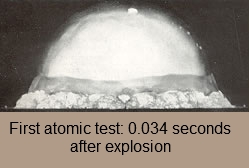 supposed to admit to the opposite sex. Our point
being that clearly, in the case of the Internet and GPS,
rather than the military trying to work its worst on
society, it has helped us all.
supposed to admit to the opposite sex. Our point
being that clearly, in the case of the Internet and GPS,
rather than the military trying to work its worst on
society, it has helped us all.
We would say the same for the atom
and hydrogen bombs too.
As we look at the confrontation that
continues to escalate between the West and Iran, over Iran’s
stubborn insistence that it has a right to develop its own
nuclear technology (read: bomb), it serves our purpose to look again at what
the atom bomb brought us all.
For one thing, while during its
development there were a number of scientists that posited
that it might cause the world ill, none of them walked away
from their jobs or quit the project. Instead, to a man they
realized that society is wholly unable to stop the advent of
science or technology, whether it wants to or not. Because
of the free thinking capabilities of the human race, to try
to do so would be folly. Instead, what early scientists knew then and we
know today is that whether science or technology is used for
good
 or evil is not based on the technology per se,
but on the intent of the people who have access to it and
control it.
or evil is not based on the technology per se,
but on the intent of the people who have access to it and
control it.
In the case of technologies that can
be militarized, this is especially true. And in Iran’s case,
this factor is what drives the Israelis crazy. The intent of
the leaders of Iran is what counts, not Iran’s ability to
cause nuclear fission.
One can see this by looking at those
scientists that have lined up on the side of trying to
develop even more destructive military technologies… in the
interest of finding what is usually referred to as the
Ultimate Weapon. Among them are distinguished people like
Alfred Nobel, Niels Bohr, Werner Heisenberg, Robert Boyle,
Paul Dirac and others who thought of weapons as having the
ability to contribute positively to society.
Weapons, contributing positively to
society? How so?
By making it possible to eliminate
the blight of war, or at least bring its excesses under
control, through the invention of a weapon so terrible that
no one would have the courage to use it, lest it be used
against them too. Therein, the Ultimate Weapon.
In a few months it will be 67 years
since the first atom bomb was exploded on July 16, 1945, at
Los Alamos, New Mexico. Used only twice in anger (August 6
and 9), the severity of the destruction it wrought in the
real world (versus the theoretical world of quantum physics
and mathematics) saw its further actual use quickly set
aside in favor of the threat of its use. In essence, with
its first explosion it became the Ultimate Weapon.
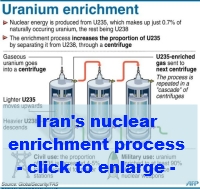 Few could argue that the existence
of this Ultimate Weapon has caused those who possess it to
turn from considering actual use of the device to its
application in another yet different capacity: as an
instrument of politics. This became possible because once
the world knew what the atomic bomb could do, there was no
need to actually do it. The theory of Mutually Assured
Destruction proved this point, as any reasonable world
leader can see that the threat of its use on the part of
sensible countries against regimes on the wrong side of
history was sufficient to keep those countries in line. That
is, provided that those rogue countries were able to think
and act reasonably, on their own accord. But what of
countries whose doctrine of societal development is not
reasonable, not by our western standards at least?
Few could argue that the existence
of this Ultimate Weapon has caused those who possess it to
turn from considering actual use of the device to its
application in another yet different capacity: as an
instrument of politics. This became possible because once
the world knew what the atomic bomb could do, there was no
need to actually do it. The theory of Mutually Assured
Destruction proved this point, as any reasonable world
leader can see that the threat of its use on the part of
sensible countries against regimes on the wrong side of
history was sufficient to keep those countries in line. That
is, provided that those rogue countries were able to think
and act reasonably, on their own accord. But what of
countries whose doctrine of societal development is not
reasonable, not by our western standards at least?
For more than six decades every
country that has had access to the bomb has also subscribed
to the common belief that preservation of their own society
was more important than the destruction of that of their
enemy. And because of this it has been the case that the
worst destructive power that the advancement of military
science and technology could invent has served to make the
world more peaceful and safe, not less so. More
specifically, as opposed to being a threat to society, the
Ultimate Weapon has turned out to be the long sought after
war-stopper.
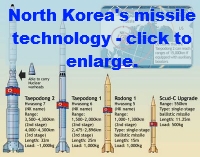 And while it continues to be the
case that technology is neither good, bad, nor always neutral,
there are some disturbing signs that things may be changing.
The reason is that while technology by itself is non
deterministic, it is also the case that it turns out to be
the ideal instrument by which society can satiate its desire
to manipulate the material world for human purposes. Don't
believe us? Just look at genetically modified crops, or even
Botox for that matter.
And while it continues to be the
case that technology is neither good, bad, nor always neutral,
there are some disturbing signs that things may be changing.
The reason is that while technology by itself is non
deterministic, it is also the case that it turns out to be
the ideal instrument by which society can satiate its desire
to manipulate the material world for human purposes. Don't
believe us? Just look at genetically modified crops, or even
Botox for that matter.
As we
relate this to the case of Iran or North Korea, the concern
becomes one of gauging whether their social values match
those of the majority of the world or not. If they do, then
they will use their increasing access to Ultimate Weapon
technology to manipulate the material world for the benefit
of humanity. If not, then we are all in for a very bumpy
ride.
Again, we make the point: whether
the advent of a particular technology ends up causing good
or evil depends not on the technology itself, but on what
humans choose to do with it. This is especially so for
military hardware, and therein our concern over both Iran
and North Korea gaining access to either nuclear
technology
or an effective ballistic missile system.
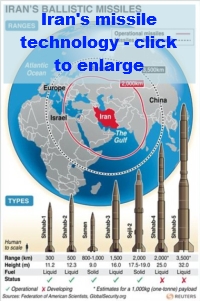 In the case of North Korea, it would
appear that while its leaders are bombastic, they are not
without intelligence. Self serving, egoistic, petulant, and
childish, yes. Stupid, no. Their effort to gain access to
Ultimate Weapon technology is likely little more than a ploy
to achieve the global footing they seek, and/or to use it to
either fatten their pockets or, hopefully, find a way to
re-enter society through the back door. Regardless, while
their doctrine of social development may be convoluted, it
appears to parallel ours enough to give us comfort that they
fear reduction of their society to a parking lot as much as
we do our own. If that is the case, then we need not fear
North Korea any more than we do Russia or China today. While it
may take a while, eventually the North Koreans will come around.
In the case of North Korea, it would
appear that while its leaders are bombastic, they are not
without intelligence. Self serving, egoistic, petulant, and
childish, yes. Stupid, no. Their effort to gain access to
Ultimate Weapon technology is likely little more than a ploy
to achieve the global footing they seek, and/or to use it to
either fatten their pockets or, hopefully, find a way to
re-enter society through the back door. Regardless, while
their doctrine of social development may be convoluted, it
appears to parallel ours enough to give us comfort that they
fear reduction of their society to a parking lot as much as
we do our own. If that is the case, then we need not fear
North Korea any more than we do Russia or China today. While it
may take a while, eventually the North Koreans will come around.
But what of Iran?
In the case of Iran, one might ask:
does their society place more emphasis and value on
preparing for the return of the Twelfth Imam, or on its own
survival? Does their doctrine of social development parallel
our own, or is it driven by messianic overtones that
undermine logical reason?
Shi’ite Islam states that Allah
shielded or hid Muhammad al-Mahdi as the Twelfth Imam so
that he would be able to return to the world at the end of
time, when he would then reappear and save it from the chaos
it was descending into as it approached its end. And while Shi’ite orthodoxy has it that humans are powerless to
encourage the Twelfth Imam to return, President Mahmoud
Ahmadinejad, a member of the Hojjatieh sect, believes that
if he can cause enough chaos and hasten the end of the
world's coming, he can bring about the return of the Twelfth
Imam sooner than Allah might normally have had it.
 Considering this, one can quickly
see that whereas world leaders who seek to avoid the end of
the world can leverage the concept of Mutually Assured
Destruction and the utility of the Ultimate Weapon to assure
world peace, those who seek a quicker end to humanity see
just the opposite: a chance to end things now, quickly, on
their terms. That being the case, MAD and the strength of
the Ultimate Weapon play perfectly into the hands of a wacky
society such as that of Iran, a messianic cult that says it
wants to hasten the end of the world, not stop it.
Considering this, one can quickly
see that whereas world leaders who seek to avoid the end of
the world can leverage the concept of Mutually Assured
Destruction and the utility of the Ultimate Weapon to assure
world peace, those who seek a quicker end to humanity see
just the opposite: a chance to end things now, quickly, on
their terms. That being the case, MAD and the strength of
the Ultimate Weapon play perfectly into the hands of a wacky
society such as that of Iran, a messianic cult that says it
wants to hasten the end of the world, not stop it.
This is deeply troublesome. More
than just being a means to turn Israel into a has been
experiment,
Iran’s continuing effort to develop nuclear weapons seems
based more so on attaining religious goals than dealing a
neighboring country a devastating blow. Judged by the
standards of reason, this form of Islamic belief threatens
the world, not just Israel. One might ask: is all this crazy
talk simply Iranian nationalist and Islamist rhetoric,
something designed to intimidate the west, or does it
represent their true, core beliefs?
One might also ask: can we afford to
wait and find out?
For as long as rogue regimes
continue to threaten the safety of others, those who wish to
see a peaceful world will have to use the military force
they have at their disposal, both manpower and technology,
to suppress and stop those who would use the Ultimate Weapon
for non-peaceful purposes. In this regard, and
especially
with respect to Iran, the preemptive aspects of the
Bush
Doctrine are beginning to look more and more attractive.


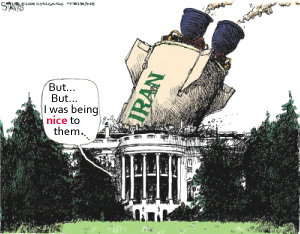
Click to read the next two articles:
Article II
Article III
Have a comment on this article? Send it
to us. If you are a member of the Association we will
gladly publish it.
If you are not, well, it only costs
$30.00 a year to become a member and have your views heard...
and because
we are a fully compliant non-profit organization your payment is tax
deductable.

